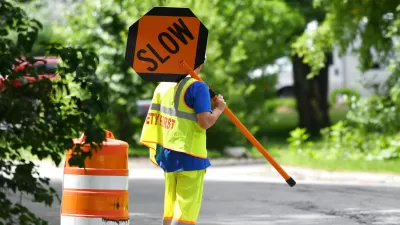Before Katrina, New Orleans was unfriendly and unpopular for cyclists. Today, the city has 15 streets with bike lanes totaling 40 miles of bike pathway, and is gunning to be as bike-friendly as Portland or Seattle.
Since 2007, the city has spent about $100 million of Hurricane Katrina recovery funds to rehabilitate roads. New Orleans has paved 56 miles with new asphalt on 55 heavily used streets and plan to pave 26 more streets, reports Cain Burdeau for the Associated Press.
"Ridership has also grown. In 2010, New Orleans ranked 12th in the number of bicycle commuters among American cities, an 84 percent increase in bike commuters since 2005, according to the latest Census data."
Even though the city has come a long way, streets still have potholes, debris on the road and missing stop signs are still problems the city need to cover.
"In other words, New Orleans is just like most other American cities - hardly the kind of place where the cyclist comes first."
FULL STORY: New roads post-storm make New Orleans cycling city

Maui's Vacation Rental Debate Turns Ugly
Verbal attacks, misinformation campaigns and fistfights plague a high-stakes debate to convert thousands of vacation rentals into long-term housing.

Planetizen Federal Action Tracker
A weekly monitor of how Trump’s orders and actions are impacting planners and planning in America.

San Francisco Suspends Traffic Calming Amidst Record Deaths
Citing “a challenging fiscal landscape,” the city will cease the program on the heels of 42 traffic deaths, including 24 pedestrians.

Defunct Pittsburgh Power Plant to Become Residential Tower
A decommissioned steam heat plant will be redeveloped into almost 100 affordable housing units.

Trump Prompts Restructuring of Transportation Research Board in “Unprecedented Overreach”
The TRB has eliminated more than half of its committees including those focused on climate, equity, and cities.

Amtrak Rolls Out New Orleans to Alabama “Mardi Gras” Train
The new service will operate morning and evening departures between Mobile and New Orleans.
Urban Design for Planners 1: Software Tools
This six-course series explores essential urban design concepts using open source software and equips planners with the tools they need to participate fully in the urban design process.
Planning for Universal Design
Learn the tools for implementing Universal Design in planning regulations.
Heyer Gruel & Associates PA
JM Goldson LLC
Custer County Colorado
City of Camden Redevelopment Agency
City of Astoria
Transportation Research & Education Center (TREC) at Portland State University
Jefferson Parish Government
Camden Redevelopment Agency
City of Claremont




























